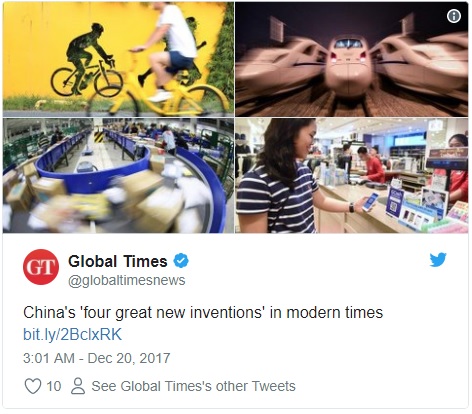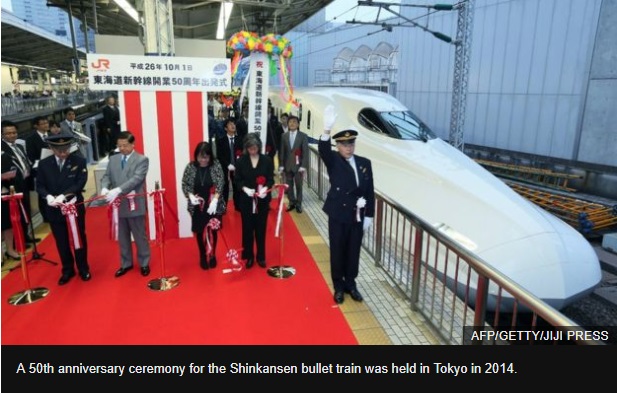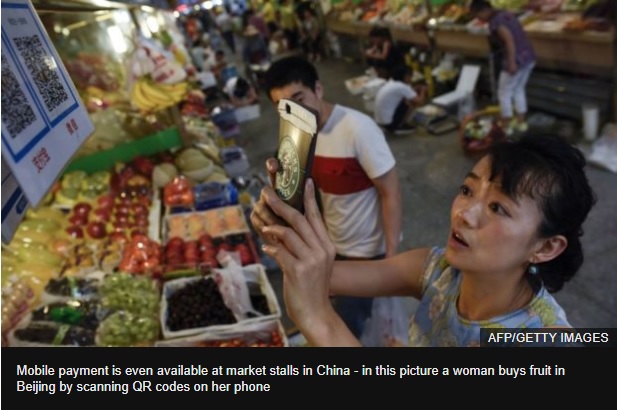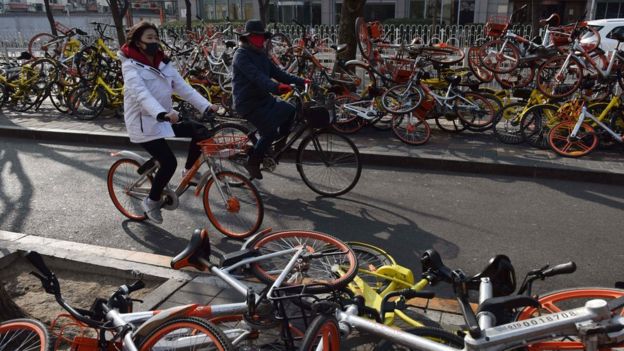Claim: China invented high-speed rail, mobile payment, e-commerce, and bike-sharing.
Reality Check verdict: China did not invent any of these technologies - but it has led the way in their widescale implementation.
This is a claim that has repeatedly come up in Chinese state media since May 2017.

It was most recently repeated at China's National People's Congress (NPC) by Pony Ma - an NPC delegate who's better known as the chief executive of the Chinese internet giant Tencent. He's also the richest man in China, according to the Hurun Global Rich List.
"We have a new phrase called the 'new four great inventions' in China, including high-speed railway, online shopping, mobile payment and sharing bikes," he told journalists at the NPC.
But these technologies did not originate in China and were first devised decades ago.
Where did the claim come from?
The provenance of the claim appears to be a Beijing Foreign Studies University survey from May 2017, which asked young people from 20 countries to list the technology they "most wanted to bring back" to their country from China.
The respondents' top answers were high-speed rail, mobile payment, bike sharing, and e-commerce.
Since then, Chinese media and officials have drawn on this to promote these technologies as China's "four new great inventions" in modern times.
Why keep making the claim?
The term "four new inventions" harks back to the "four great inventions" of ancient China - papermaking, gunpowder, printing and the compass.
China has been putting strong emphasis on technological advancement as it seeks to become what it calls an "innovation nation" by 2020.
"After years of subordination to the technological supremacy of developed nations in the West, China has come to realise the importance of developing core technologies on its own. Only by doing so can it truly gain independence and win respect from both partners and competitors," the Xinhua news agency says.
Already, China is the second-largest spender on research and development after the US, accounting for 21% of the world's total of nearly $2 trillion in 2015, according to the World Economic Forum.
High-speed rail
There is no standardised definition of what constitutes "high-speed rail." The European Union defines "high-speed" as at least 250km/h (155mph) on new tracks, and 200km/h on older tracks.
According to the Worldwide Rail Organisation (UIC), the first high-speed train service began in 1964 - Japan's Shinkansen or bullet train.
There had been significant speed records set before in Europe - in France, a train reached 331 km/h in 1955 - but the Tokyo to Osaka line was the first regular service to travel that fast - the first trains had a maximum speed of 210 km/h.
China opened its first high-speed rail line in 2008, from Beijing to Tianjin, just ahead of the Olympic Games.
Mobile payments
Some of the first payments by a mobile device were made in 1997 in Finland.
Local news reports from the time (in Finnish) stated that Telecom Finland had enabled a music jukebox and drinks vending machines to be operated by calling a payphone number - including Coca-Cola machines in Helsinki Airport.
However, some argue that mobile payment technology truly began when Apple Pay made its debut in 2014.

E-commerce
Englishman Michael Aldrich is credited with inventing the online shopping concept in 1979.

Using a technology called Videotex, Mr Aldrich connected an ordinary TV set to the local retailer's computer via a telephone line.
But it wasn't until the 1990s that e-commerce became popular, when Amazon and eBay launched their websites in 1995.
Bike-sharing
Lastly, the first bike-sharing concept - called the "white bicycle plan" - was introduced in Amsterdam in the 1960s by the Dutch counterculture movement Provo. However, the bikes were confiscated by the police in case they encouraged theft.
The first large-scale bike sharing schemes began in the 1990s in European cities - Copenhagen is credited with introducing the first.
But Chinese firms like Mobike and Ofo are at the forefront of "dockless" bike-sharing, a new system where users locate bikes with their smartphone, and drop them off anywhere without the need to park them at a specific dock.


